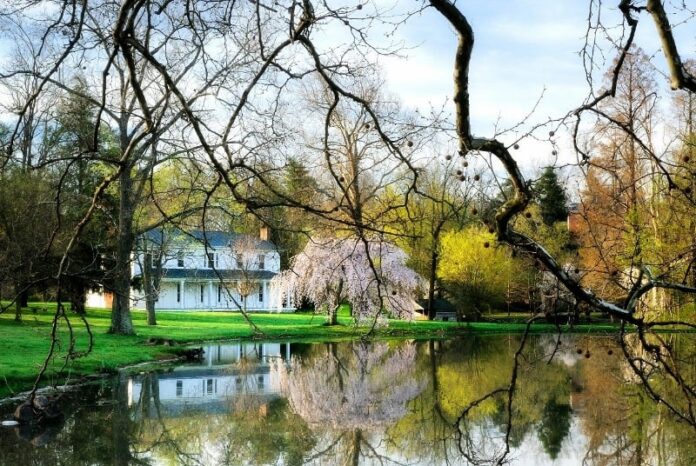
Solitude, the oldest building on Virginia Tech’s Blacksburg campus, will take center stage this weekend as part of the fifth annual Mountains of Music Homecoming.
Sponsored by The Crooked Road, a heritage music trail that winds through Southwest Virginia for more than 300 miles, Mountains of Music Homecoming is a nine-day celebration of the region’s traditional music, cultural riches, and natural beauty.
On June 8, a series of performances and demonstrations will highlight the cultural heritage of the different groups of people who occupied the Solitude site across the past several centuries. The event, “Experience Solitude as Contested Space Through Its Folklife, Folk Music, and Folklore,” will explore the site’s complicated history.
“Understanding why Solitude can be called ‘contested space’ is the theme of this year’s event,” said Anita Puckett, an associate professor of Appalachian studies in the Department of Religion and Culture. “The site has almost constantly been a place where different groups were at odds with each other or actually fighting.”
Puckett cites a 1755 raid in which a dozen settlers were either abducted or killed during the French and Indian War, the enslavement of workers on the site beginning in the early 19th century, conflicts between the owners and the emancipated workers following the Civil War, and then, long after the site became part of Virginia Tech, the struggle of faculty to preserve the site’s buildings.
Through Puckett, the Appalachian Studies Program at Virginia Tech now manages the site, which is located near the Duck Pond. Solitude, whose initial construction began in 1802, was officially listed on the National Register of Historic Places in 1989.
In March of this year, the Virginia Tech Board of Visitors approved a resolution to name the log outbuilding adjacent to the main building the Fraction Family House, in honor of the enslaved families who worked on the Solitude estate. Historical records show that the McNorton, Saunders, and Fraction families all lived there at one time or another, with the Fractions, whose ethnic origin was Yoruba in Nigeria, being the most numerous.
“The naming of this cabin acknowledges the contributions of the Fraction family in the creation and emergence of Virginia Tech as a major land-grant university,” said Puckett. “It also reflects the university’s efforts to transform a historic location into a site for the interpretation of the African-American experiences on campus and in the region.”
Beginning at 10 a.m. on June 8, Kerri Moseley-Hobbs, a descendant of the Fraction family and the author of “More than a Fraction,” will join Puckett and Bert Rodriguez, a professor in the School of Architecture and Design, in leading tours of the houses and the grounds. The three guides will not only touch on the lives of the many people who called the site home, but they will also recognize the central role of the people who were enslaved there.
The day’s scheduled events will start at 11:15 with remarks by Melissa Faircloth, director of Virginia Tech’s American Indian and Indigenous Community Center, on the Native American history of the area. Moseley-Hobbs will also speak briefly about her family’s history at the site.
A free lunch will then offer West African dishes along with standard Appalachian fare of chicken and dumplings, fried chicken strips, green beans, black-eyed peas, and apple pie. Tables and chairs under a tent will enable visitors to sit and enjoy the music of Homebody, a Bluegrass band.
The afternoon’s events will include a dance performance by Fraction family members; Appalachian storytelling by Kathy Coleman, a master artist with the Virginia Folklife Program; and an Appalachian toy workshop for children.
At 4 p.m., the Glorylanders — an all-male a-cappella group of gospel singers from the New River Valley — will perform spiritual, traditional, and classic gospel music as a celebration of those who lived and died on the site. And then at 5 p.m., Moseley-Hobbs will perform a West African sanctification blessing outside the Fraction Family House in recognition of the lives of the people who had been enslaved there.
Free parking is available next to the site, located at 705 West Campus Drive in Blacksburg. All activities are also free.


